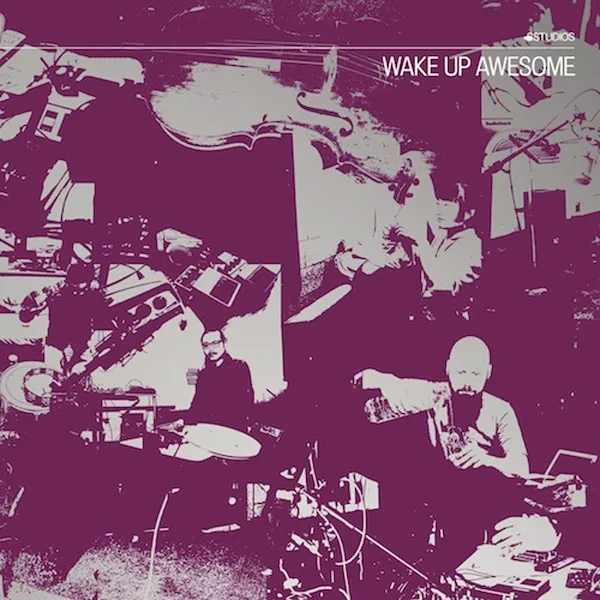REVIEW: C.SPENCER YEH, OKKYUNG LEE, LASSE MARHAUG - WAKE UP AWESOME
6 JANUARY 2014
REVIEW: C.SPENCER YEH, OKKYUNG LEE, LASSE MARHAUG - WAKE UP AWESOME
6 JANUARY 2014
REVIEW: C.SPENCER YEH, OKKYUNG LEE, LASSE MARHAUG - WAKE UP AWESOME
6 JANUARY 2014

Steve Coogan recently commented, in Esquire: "I like things to be about something. You watch somebody juggle and it's impressive, but it doesn't mean anything."
C. Spencer Yeh, Okkyung Lee, and Lasse Marhaug's "Wake Up, Awesome" is an apt target for Coogan's comments, a clever bit of juggling that pulls out every available trick to make itself conspicuously meaningless. Elegant bits of string performance mix with studio chop-and-screw, funny mouth noises, cello farts, and dusty samples. It has no coherence as an artistic product, except what it is not—the album is an exercise in negativity, in showing what its creators are trying to avoid. And as with so many projects that begin with this attitude, it quickly becomes enslaved to technique.
The bulk of sound on the LP is devoted to a virtuoso production exercise, of the "what is that noise" variety. There are few structures besides repetition. There is tempo, sort of, but no time.
Then the mask breaks, and (by way of dabbling with its opposite) the album becomes, occasionally, very appealing. "Ophelia Gimme Shelter" is lovely: a more cerebral, less chamber-y version of a composition by Hildur Gudnadottir, perhaps. Likewise "Mission Nothing," which is a sad and perfect little nocturne at the centre of the maelstrom. But the composers quickly move away from songs like this—from songs at all, in fact. They know the pitfalls of this arena. Presumably, unlike Arvo Part, they are wary of being accused of sentimentality or academicism. Why make minimalist mood-pieces when you can force the strings to sound like a grinding saw for 3 minutes? I am guessing that the purpose of those impossibly elegant moments is phatic, as if to say, "we can do these things that you like, and extremely well, but we know better."
What they know, of course, is the cred that is still attached to noise. What' s interesting about such "challenging" music, however, is precisely how unchallenging it is, from a critical standpoint. Leading-edge publications love what they don't understand, and genuinely admire work that is "difficult" (as opposed to "accessible"). For contrarians, "Metal Machine Music" and the Boredoms' "Super Roots" series are still touchstones of impossible cool, in part because they make so little compromise with conventional music—and also, presumably, because they managed to piss off so many listeners.
I, myself, love many of the modern classical composers who would be seen as the grandparents of this kind of project. But Berg, Messiaen, even Schoenberg, combined the post-tonal with references to other music—with stuff that, for whatever reason, meant something. Berg liked to work in snippets of folk song, in order to channel exactly the kind of sentimentality, the sweetness, that Yeh, Lee and Marhaug are so allergic to. But this meant that these great compositions were able to work in a meaningful area between received forms and the new space of the post-tonal. They were in conversation with something, and for this reason you can understand what they are about—which is more, in the end, than a bunch of cool methods for generating sounds.
The opening track, "Wake Up Awesome," is perhaps the most interesting thing on the record. This is precisely because, like Berg's music, it has some sort of vestigial reference. It is either noise becoming music, or the reverse. It has a kind of heightened context, as the opener; it sounds, in a beautifully casual way, like an orchestra warming up. There is a very limited sense of pressure, here—it is as if the composers haven't really started, and thus don't feel the need to be important, or coolly evasive.
The irony of "Wake Up Awesome" (both the album and the track), is that they make one long, somewhat conservatively, for a genuinely "classical" sensibility. One where the meaningful forms were already supplied, and artists could put technique in the service of interpretation (gasp) and not in being strange for its own sake. For all of the clever glitches and the conceptualist bombast, the gentle moments on "Wake Up Awesome" suggest that Yeh, Lee, and Marhaug may sometimes be more comfortable within the reassuring constraints of form, rather than its opposite.
Tracklist
01. Wake Up Awesome
02. Hairslide
03. The Mermen of Poetry
04. Ophelia Gimme Shelter
05. The Mermaids of Extended Technique
06. Magic Seagull Lamp
07. Mission: Lazy
08. Mission: Nothing
09. Throw Down the Fishcake
10. Neutrons Whatever
11. Serious Cat’s Milk
12. Anise Tongue and Durian Wet Dream
13. Mission: Possible
14. RSVP Skunk
15. Tonight We Sleep Like Empty Hard Drives

Steve Coogan recently commented, in Esquire: "I like things to be about something. You watch somebody juggle and it's impressive, but it doesn't mean anything."
C. Spencer Yeh, Okkyung Lee, and Lasse Marhaug's "Wake Up, Awesome" is an apt target for Coogan's comments, a clever bit of juggling that pulls out every available trick to make itself conspicuously meaningless. Elegant bits of string performance mix with studio chop-and-screw, funny mouth noises, cello farts, and dusty samples. It has no coherence as an artistic product, except what it is not—the album is an exercise in negativity, in showing what its creators are trying to avoid. And as with so many projects that begin with this attitude, it quickly becomes enslaved to technique.
The bulk of sound on the LP is devoted to a virtuoso production exercise, of the "what is that noise" variety. There are few structures besides repetition. There is tempo, sort of, but no time.
Then the mask breaks, and (by way of dabbling with its opposite) the album becomes, occasionally, very appealing. "Ophelia Gimme Shelter" is lovely: a more cerebral, less chamber-y version of a composition by Hildur Gudnadottir, perhaps. Likewise "Mission Nothing," which is a sad and perfect little nocturne at the centre of the maelstrom. But the composers quickly move away from songs like this—from songs at all, in fact. They know the pitfalls of this arena. Presumably, unlike Arvo Part, they are wary of being accused of sentimentality or academicism. Why make minimalist mood-pieces when you can force the strings to sound like a grinding saw for 3 minutes? I am guessing that the purpose of those impossibly elegant moments is phatic, as if to say, "we can do these things that you like, and extremely well, but we know better."
What they know, of course, is the cred that is still attached to noise. What' s interesting about such "challenging" music, however, is precisely how unchallenging it is, from a critical standpoint. Leading-edge publications love what they don't understand, and genuinely admire work that is "difficult" (as opposed to "accessible"). For contrarians, "Metal Machine Music" and the Boredoms' "Super Roots" series are still touchstones of impossible cool, in part because they make so little compromise with conventional music—and also, presumably, because they managed to piss off so many listeners.
I, myself, love many of the modern classical composers who would be seen as the grandparents of this kind of project. But Berg, Messiaen, even Schoenberg, combined the post-tonal with references to other music—with stuff that, for whatever reason, meant something. Berg liked to work in snippets of folk song, in order to channel exactly the kind of sentimentality, the sweetness, that Yeh, Lee and Marhaug are so allergic to. But this meant that these great compositions were able to work in a meaningful area between received forms and the new space of the post-tonal. They were in conversation with something, and for this reason you can understand what they are about—which is more, in the end, than a bunch of cool methods for generating sounds.
The opening track, "Wake Up Awesome," is perhaps the most interesting thing on the record. This is precisely because, like Berg's music, it has some sort of vestigial reference. It is either noise becoming music, or the reverse. It has a kind of heightened context, as the opener; it sounds, in a beautifully casual way, like an orchestra warming up. There is a very limited sense of pressure, here—it is as if the composers haven't really started, and thus don't feel the need to be important, or coolly evasive.
The irony of "Wake Up Awesome" (both the album and the track), is that they make one long, somewhat conservatively, for a genuinely "classical" sensibility. One where the meaningful forms were already supplied, and artists could put technique in the service of interpretation (gasp) and not in being strange for its own sake. For all of the clever glitches and the conceptualist bombast, the gentle moments on "Wake Up Awesome" suggest that Yeh, Lee, and Marhaug may sometimes be more comfortable within the reassuring constraints of form, rather than its opposite.
Tracklist
01. Wake Up Awesome
02. Hairslide
03. The Mermen of Poetry
04. Ophelia Gimme Shelter
05. The Mermaids of Extended Technique
06. Magic Seagull Lamp
07. Mission: Lazy
08. Mission: Nothing
09. Throw Down the Fishcake
10. Neutrons Whatever
11. Serious Cat’s Milk
12. Anise Tongue and Durian Wet Dream
13. Mission: Possible
14. RSVP Skunk
15. Tonight We Sleep Like Empty Hard Drives

Steve Coogan recently commented, in Esquire: "I like things to be about something. You watch somebody juggle and it's impressive, but it doesn't mean anything."
C. Spencer Yeh, Okkyung Lee, and Lasse Marhaug's "Wake Up, Awesome" is an apt target for Coogan's comments, a clever bit of juggling that pulls out every available trick to make itself conspicuously meaningless. Elegant bits of string performance mix with studio chop-and-screw, funny mouth noises, cello farts, and dusty samples. It has no coherence as an artistic product, except what it is not—the album is an exercise in negativity, in showing what its creators are trying to avoid. And as with so many projects that begin with this attitude, it quickly becomes enslaved to technique.
The bulk of sound on the LP is devoted to a virtuoso production exercise, of the "what is that noise" variety. There are few structures besides repetition. There is tempo, sort of, but no time.
Then the mask breaks, and (by way of dabbling with its opposite) the album becomes, occasionally, very appealing. "Ophelia Gimme Shelter" is lovely: a more cerebral, less chamber-y version of a composition by Hildur Gudnadottir, perhaps. Likewise "Mission Nothing," which is a sad and perfect little nocturne at the centre of the maelstrom. But the composers quickly move away from songs like this—from songs at all, in fact. They know the pitfalls of this arena. Presumably, unlike Arvo Part, they are wary of being accused of sentimentality or academicism. Why make minimalist mood-pieces when you can force the strings to sound like a grinding saw for 3 minutes? I am guessing that the purpose of those impossibly elegant moments is phatic, as if to say, "we can do these things that you like, and extremely well, but we know better."
What they know, of course, is the cred that is still attached to noise. What' s interesting about such "challenging" music, however, is precisely how unchallenging it is, from a critical standpoint. Leading-edge publications love what they don't understand, and genuinely admire work that is "difficult" (as opposed to "accessible"). For contrarians, "Metal Machine Music" and the Boredoms' "Super Roots" series are still touchstones of impossible cool, in part because they make so little compromise with conventional music—and also, presumably, because they managed to piss off so many listeners.
I, myself, love many of the modern classical composers who would be seen as the grandparents of this kind of project. But Berg, Messiaen, even Schoenberg, combined the post-tonal with references to other music—with stuff that, for whatever reason, meant something. Berg liked to work in snippets of folk song, in order to channel exactly the kind of sentimentality, the sweetness, that Yeh, Lee and Marhaug are so allergic to. But this meant that these great compositions were able to work in a meaningful area between received forms and the new space of the post-tonal. They were in conversation with something, and for this reason you can understand what they are about—which is more, in the end, than a bunch of cool methods for generating sounds.
The opening track, "Wake Up Awesome," is perhaps the most interesting thing on the record. This is precisely because, like Berg's music, it has some sort of vestigial reference. It is either noise becoming music, or the reverse. It has a kind of heightened context, as the opener; it sounds, in a beautifully casual way, like an orchestra warming up. There is a very limited sense of pressure, here—it is as if the composers haven't really started, and thus don't feel the need to be important, or coolly evasive.
The irony of "Wake Up Awesome" (both the album and the track), is that they make one long, somewhat conservatively, for a genuinely "classical" sensibility. One where the meaningful forms were already supplied, and artists could put technique in the service of interpretation (gasp) and not in being strange for its own sake. For all of the clever glitches and the conceptualist bombast, the gentle moments on "Wake Up Awesome" suggest that Yeh, Lee, and Marhaug may sometimes be more comfortable within the reassuring constraints of form, rather than its opposite.
Tracklist
01. Wake Up Awesome
02. Hairslide
03. The Mermen of Poetry
04. Ophelia Gimme Shelter
05. The Mermaids of Extended Technique
06. Magic Seagull Lamp
07. Mission: Lazy
08. Mission: Nothing
09. Throw Down the Fishcake
10. Neutrons Whatever
11. Serious Cat’s Milk
12. Anise Tongue and Durian Wet Dream
13. Mission: Possible
14. RSVP Skunk
15. Tonight We Sleep Like Empty Hard Drives



